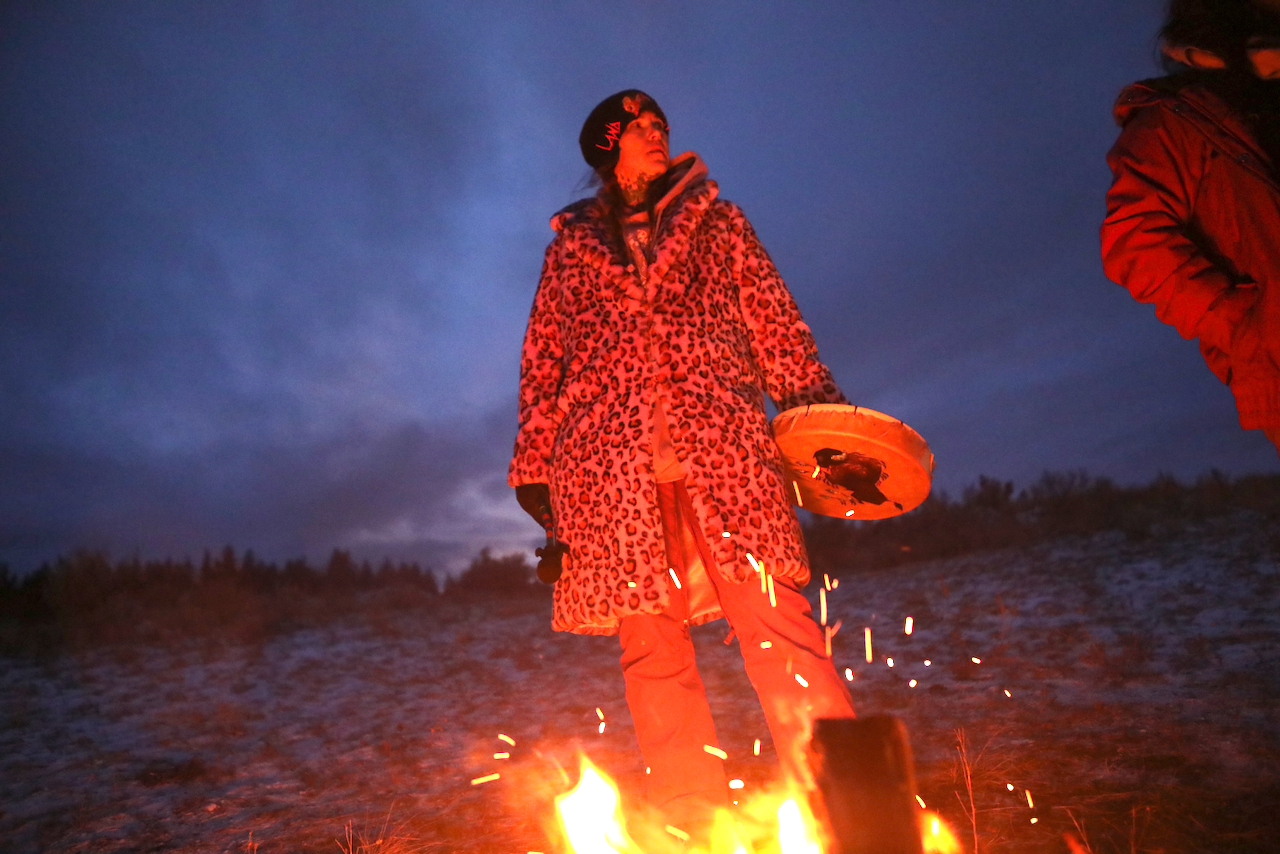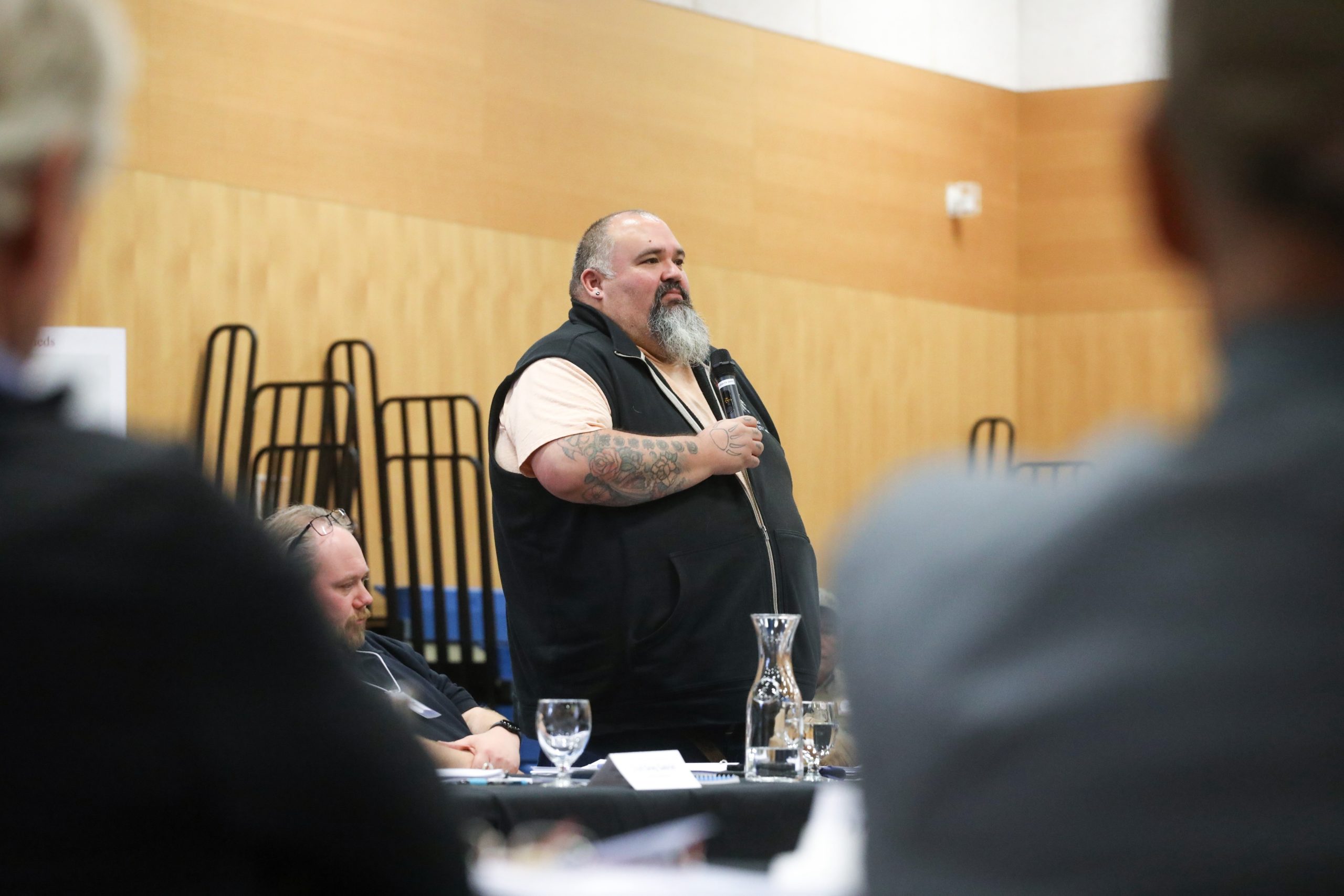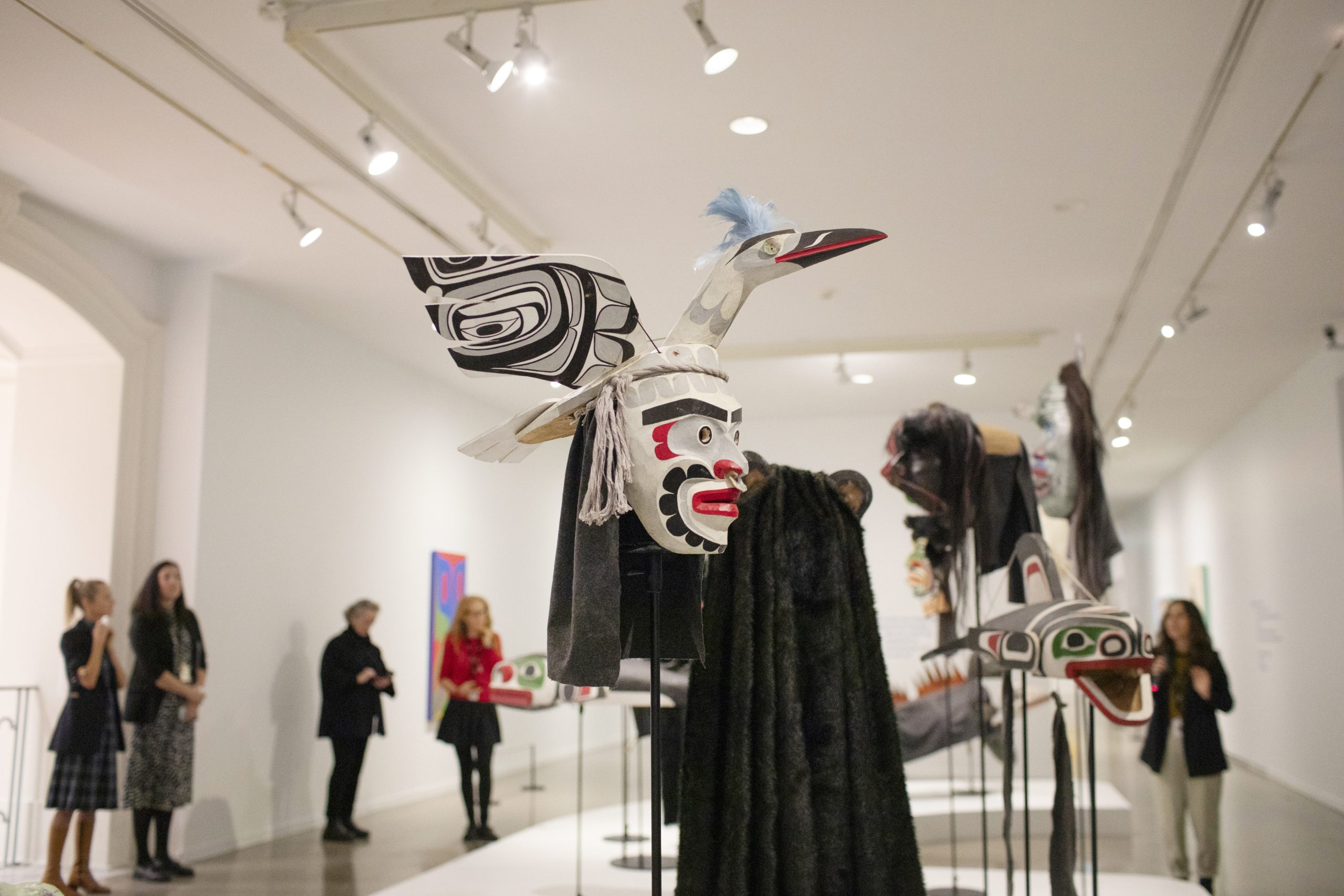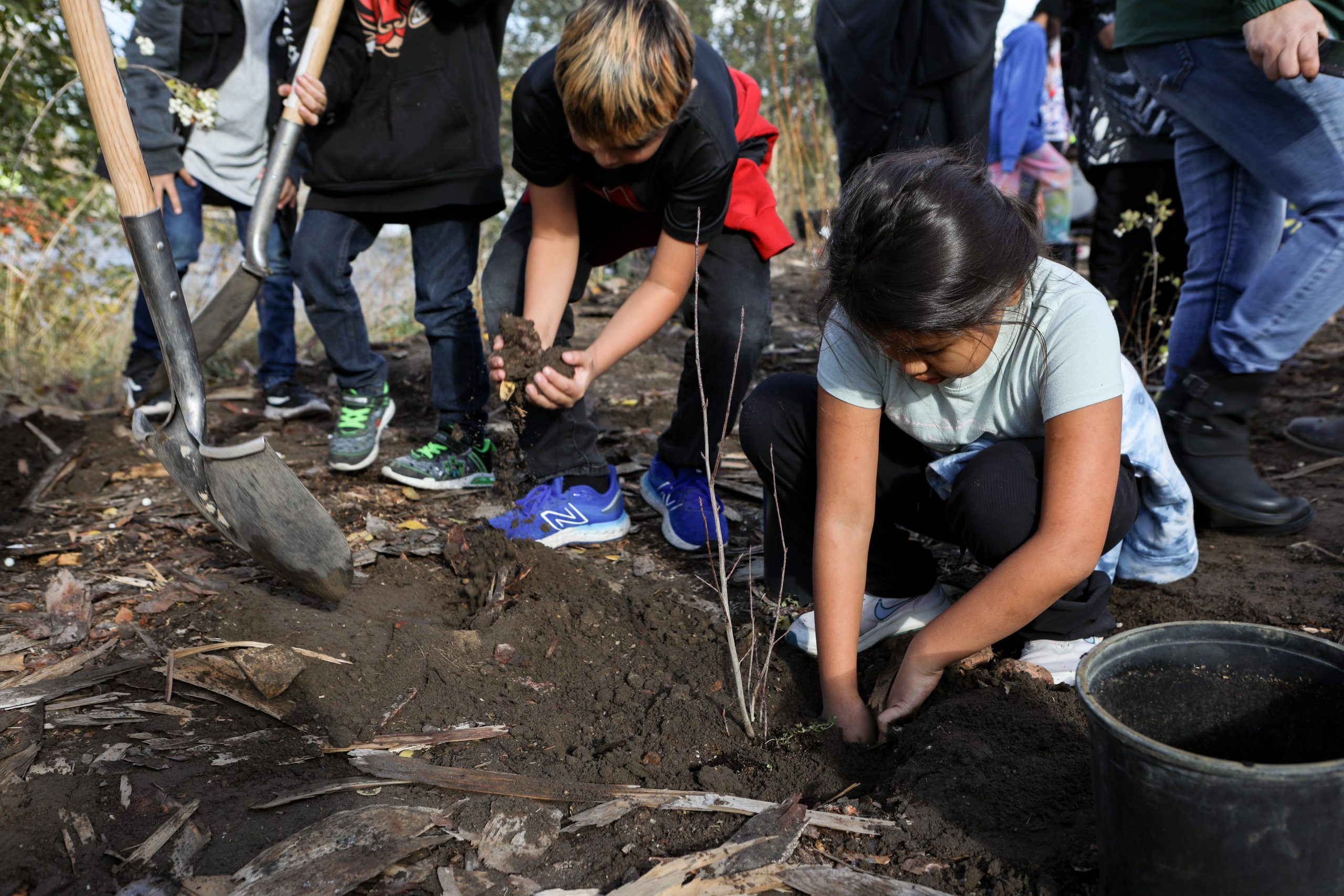‘Honesty is a spiritual power’: OKIB Youth Justen Peters of BCAFN shares his journey
Justen Peters was inspired by how economic prosperity could improve the health of his community

The sun peaks out and the clouds clear from the skies. Snow is melting around Mission Creek, a tributary that flows through syilx homelands and into Okanagan Lake. Justen Peters
Justen Peters, who is from the Okanagan Indian Band (OKIB), walks across a footbridge while proudly announcing his name in the nsyilxcən language. In doing so, he introduces himself to the land and to those listening to his message. This is a traditional practice of the syilx people.
“I wanted to come here because it’s the tmixʷ (life force), it’s the tmxʷulaxʷ (power of place). It’s the siwɬkʷ, it’s the water, it’s the cure,” says Peters. He is meeting with IndigiNews to share his journey, and says it’s important to be on the land when talking about its power for healing intergenerational trauma.
“It’s out here, in nature. And it’s within us, it’s with breathing, and with connecting with others.”
Listen to Peters introduce himself in nsyilxcən here. Justen Peters, Justen Peters, Justen Peters, Justen Peters
Peters is currently sitting in his last term on the BC Assembly of First Nations (BCAFN,) as the elected BCAFN Male Youth Representative. It’s part of his commitment to showing up for his community, he says.
“Know yourself, and your strengths, and your weaknesses,” he says.
Recollections of a rez kid
“I grew up in Salmon River with my mom and my grandmother, my father died when I was young. So I wasn’t connected to that part of my family. But my uncle Gerald and my great uncle Riley were my male role models growing up.”
“I have very happy memories of my early childhood, being with my grandma.”
Peters says he has fond memories of growing up on the reserve with his cousins, who he says were more like siblings – which is typical within Indigenous kinship.
“As Native people, we see our cousins as our brothers and sisters, our aunts and our uncles as our moms and dads, and I guess naturally our biological fathers and mothers are maybe something closer…there’s just another layer of closeness and family with us,” he says.
But when he started attending school off the reserve, Peters’ life took a turn.
“I think it was just the structure, it’s just the way the school system was, it just wasn’t a fit for me.”
“I was able to do the work easily and do it well but I was just the rambunctious kid and I fell into a depression,” he says.
When he was 13 years old, he discovered the R’Native Voice program that was run by the Okanagan Nation Alliance, and designed to empower syilx Youth to find their voice. Using syilx teachings, it supports young people in building a foundation of cultural belonging in their homelands.
“(There’s) this real importance of connecting us, and the two most important things from those programs was being with other Native kids because I went to school in Armstrong and it was predominantly white.”
“The second most important thing is we were constantly told to use our voice. We’d sit …and do talking circles, we were asked to talk about whatever we learned and how it made us feel and the history,” he says.
“We had these really open dialogues amongst each other. And I took that skill, and I brought it back to school. And it allowed me to be more talkative and be more of myself,” he says.
With his teachings, language, and connection to community as a foundation, Peters eventually entered the world of government and politics.
The ‘Professional Indian’
One day recently, as Peters was scrolling through his Facebook he came across an old picture of himself at 17. He and other Youth were part of a photo series in which they each held up a sign that said the career they aspired to.
“[Other] kids were like, ‘I want to be a plumber,’ ‘I want to be a line worker,’ ‘I want to be a doctor,’ and then there’s just me with a big smile on my face, and it says, ‘Professional Indian,’” he recalls as he chuckles.
In his late teens, he started using his voice openly and loudly.
“I just sort of tried to put myself out there and talk, you know, when you’re young, and you think you know everything, and you know nothing?”
“You just have a very narrow view. And my very narrow view was like, ‘Oh, we need to take our land back,’” he recalls.
That’s how Peters learned that within that anger around land loss there is a truth.
“‘I don’t care if that’s a no trespassing sign, it’s my land anyway,’” he’d say to others when asked about land access.
“To a very slight extent, l probably thought I was super cool and badass, [and] more radicalized than angry.”
In taking those teachings from his Uncle he says it was important for him to remain focused on the greater goal, and not get lost in anger. So he did his best to continue learning and signed up for as many instructional programs as he could. Eventually, he wound up in college, and of all the learning materials he was assigned, he only saw one article on Indigenous economic development.
“(It was about) how communities that had their own money, and can control their own money, were healthier in almost every regard, they could spend the money towards culture, infrastructure, more business, more jobs,” he says.
Peters was inspired by how his community could benefit in a meaningful way from economic prosperity and decided that part of his life’s work would be to make it happen.
“That’s what was my turning point moment…it directed my attention to what I was interested in,” he says.
Entering the political realm
“We live complex lives, they say that every Native is political…so that inspired me,” says Peters of finding interest in the political realm of Indigenous self-determination.
His journey started in the summer of 2018 when he began an internship with the OKIB Group of Companies, where he was able to get his foot in the door and learn about economic opportunities for Indigenous communities.
In that position, he led the way for 30 Youth to join the B.C. Cabinet and First Nations Leaders’ Gathering, where Indigenous Youth had an opportunity to tell provincial leaders about what’s happening in their communities. Peters also got to take part in entrepreneurship programs such as the Youth Entrepreneurship Symposium (YES), which empowers Indigenous Youth in the world of entrepreneurship through skill-building.
Given all of the opportunities and political seats he’s sat in, Peters says he’s conscious of how easy it is to miss seeing the true needs of a community. To that end, he joined his community’s Okanagan Indian Band Youth Council where he is learning from the community.
“It does so much for the youth in the community. It shows that path to leadership, and it gives you the chance to develop self-awareness for oneself, yes, and for your community … treating Youth like a real investment,” he says.
The band’s Public Safety Department supports the OKIB Youth Leadership Council which exists to “engage our youth to inspire, motivate, and empower them to participate and be actively involved in the future decisions that will shape their lives, family, community and nation,” according to the website.
Peters hopes to continue supporting the council in whatever ways he can.
“I like that the Public Safety Department are all band members. They’ve all been supportive. And I would like to, no matter what, see it through with them but not to see it as an ownership thing,” he says.
Peters says that it’s important for communities to be investing in Youth and filling the gap between what it looks like to have a healthy and safe community and what it looks like to do that with spirituality embedded in it.
“I feel like those are the two biggest gaps that we don’t talk about. The (organizational aspect) gets talked about sometimes, but (lesser talked about is) the actual spiritual gap that’s within our communities.”
“If there was one change I would like to make, or to inspire, it is to fill those gaps. And it starts with ourselves,” Peters says.
“The importance of self-awareness is that it harbours honesty, it really makes us honest. And I feel like honesty is a spiritual power. With honesty, we can envision things and that can make a path for us.”
Author
Latest Stories
-
‘Bring her home’: How Buffalo Woman was identified as Ashlee Shingoose
The Anishininew mother as been missing since 2022 — now, her family is one step closer to bringing her home as the Province of Manitoba vows to search for her
-
Will you help us tend to the fire?
IndigiNews is launching a fundraising campaign to support our storytelling into 2026












